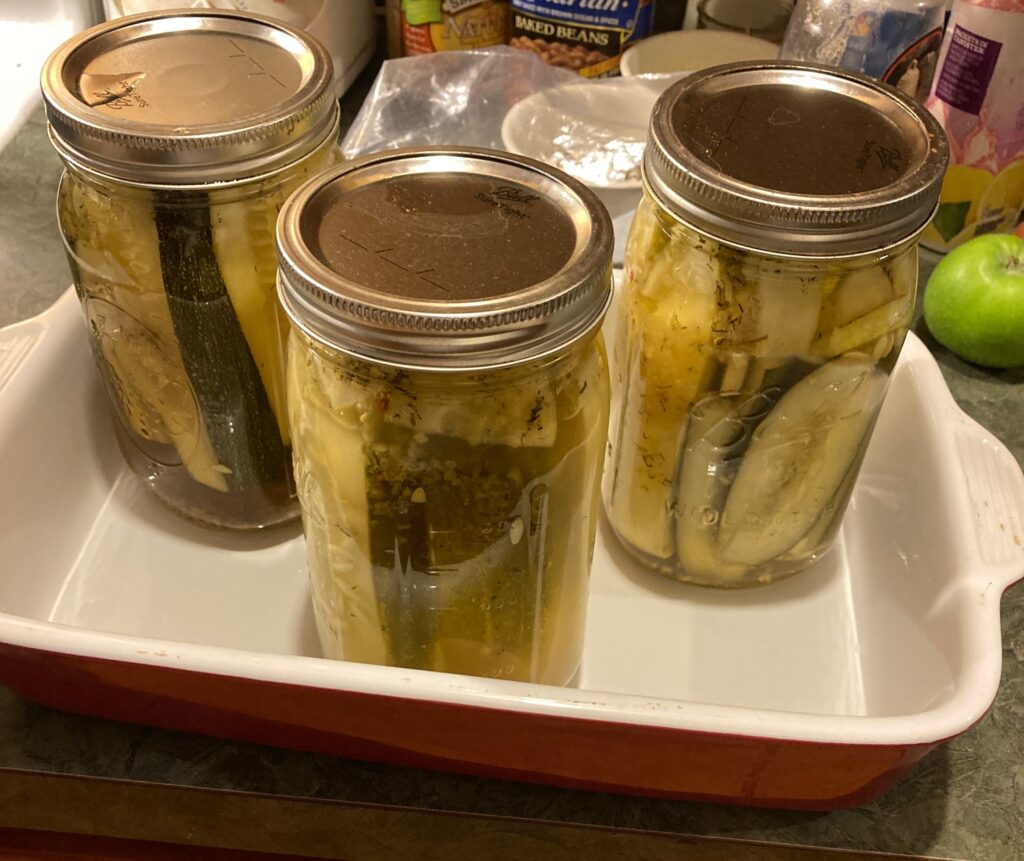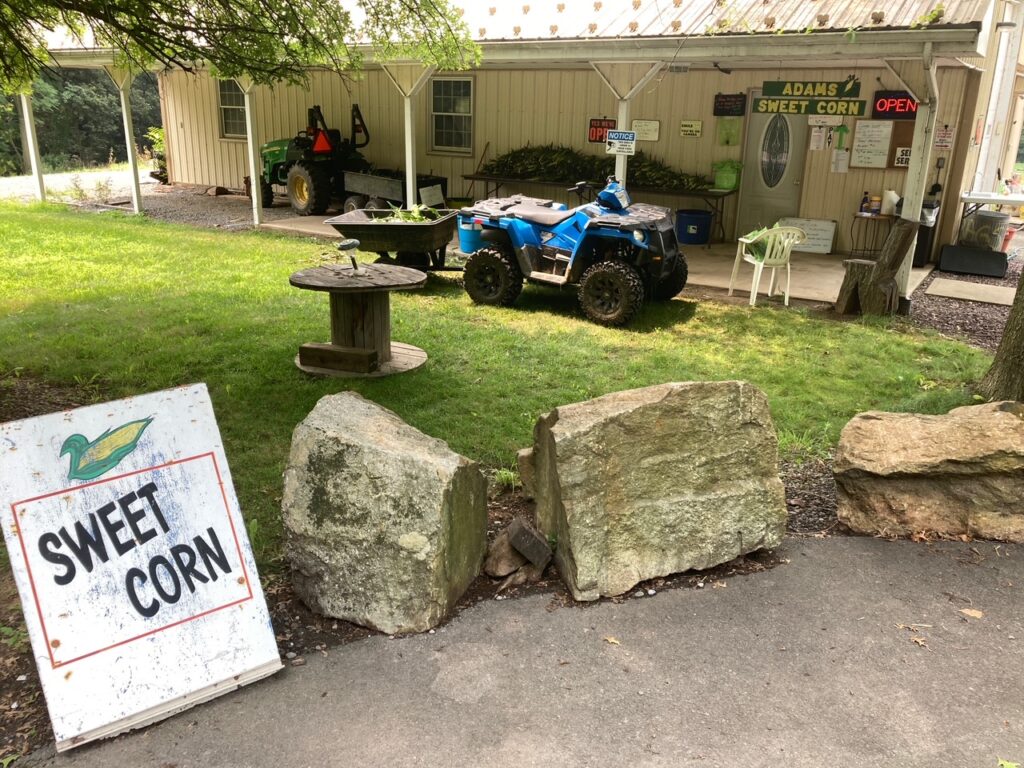Posts Tagged → berries
Why we share wild food with each other
People around the planet enjoy sharing wild food with one another, and we always have since God above evolved our species, however it is He evolved it. It is an innately human trait to both enjoy giving and receiving wild food.
Wild food is a broad category, but it excludes anything we buy, especially in a big store. Foods from stores are almost always, or are always, plants and animals raised in intensive industrial environments, replete with chemicals everywhere and in everything. Wild food usually includes fruits, herbs, and vegetables grown in our own gardens; fruits we have picked in the wild, like berries and apples; and any wild game meat or fish we have harvested. Chemicals are either non-existent or are naturally occurring in minute amounts from the native soil.
All around the planet people put a high premium on wild harvested meat. In Africa and Australia, “bush meat” is highly valued as fresh, nutritious, free of human-injected chemicals and hormones. Everywhere bush meat is eaten, it is traded in lieu of money. And when a European bites down on a size 8 piece of shot in her forkful of grouse recently from the Scottish Highlands, where it was shot on a drive, hung for three days in a cooler, and then shipped off to Spain, Germany, England, or France, she knows she is eating something special, and it tastes even better. The same is said for the meat of hunted red deer, and occasionally wild boar, both of which are highly prized foods served in restaurants and home kitchens across Europe.
Wild food is better for us, we all know that, both in terms of what is in it and also what is not in it, because (except for poached bush meat from at-risk wild animal populations in Africa) it is environmentally sustainable. It also tastes better, because it has grown up under natural circumstances. Giving and receiving it as a gift is a symbol of real friendship and caring. Wild food is something most Americans can participate in, especially as growers and givers, and so I hope that someone reading this is inspired to take a corner of their luxury status symbol yard and turn it into an unruly food garden. The pleasure of sharing the harvest with friends and neighbors is quite enjoyable.
Humans began as hunters and gatherers and we remain such, even with our thin veneer of civilization inartfully separating us from the wild world around us. Much of our innate gender differences are centered on what hunting and gathering was done by our ancestors over the past few hundred thousand years. Gathering food by hand is a natural and innately human thing to do, and most people find gardening calming and enjoyable. I guess being a real human and not a false, contrived human can be pleasurable.
Last month I picked over six pounds of blueberries and another five pounds of blackberries and red and black raspberries, about a hundred pounds of peaches, and about fifty pounds of apples. I won’t share these hard-won prizes with you by the fistful, because then the berries would all disappear within a few minutes. Rather, I will share them by mixing them into muffins, pancakes, cobblers, pies, and preserves spread onto toast, ice cream, and cakes. This way these gems last all year long, and everyone gets to share in them.
Aside from being cleaner and tastier than industrial foodstuffs wrapped in plastic and styrofoam, wild food has the benefits of bringing us closer to nature, closer to reality, closer to self-reliance and self-sustainability, and closer to people we might not normally encounter. Nature can be the sharp berry bushes we must reach through to pluck our juicy berries, and it can also be the mother bear and her cubs waiting for you and me to clear out of the scratchy berry patch so they, too, can feed on Nature’s bounty.
Nature here can also include a variety of destructive garden pests like squirrels, rabbits, groundhogs, and chipmunks, and learning to cope honestly with these artificially overabundant animals teaches us important lessons about reality versus luxurious and silly childish feelings and notions of animal welfare that are terribly destructive.
For example, artificially high populations of pest species, like squirrels and ground hogs, spread high amounts of disease and physical destruction. And when vegans strut and brag about their reliance on industrial monocultures like soy beans, they ignore the tremendous environmental and habitat destruction wrought in their vegan names. There are significant environmental costs to veganism and vegetarianism that could be offset if those adherents participated in wild food, like growing their own and trading/ bartering for what they cannot grow themselves. Few things are more annoying than listening to someone from a wealthy lifestyle bragging up their veganism/ vegetarianism while simultaneously tearing open plastic wraps and environmentally damaging containers containing industrial foods. Food isn’t just about what you put in your mouth, it is very much about where it comes from, where it was grown and where it lived before your credit card brought it home.
Hunting in America and Canada produces millions of pounds of fresh, clean, natural, wholesome wild meat for more than just the people who pull the trigger. Hunters Sharing the Harvest is a well known program that enjoys widespread support from both givers and receivers. Schools, neighborhood soup kitchens and homeless shelters, and just simple low-income people, all benefit from receiving this wild meat. And farmers and forest owners benefit from having artificially overabundant deer and hog populations thinned out so their crops can grow in peace.
For those silly people who oppose hunting, jiminy crickets, people, wake the heck up. You are not living in a fairy tale book, and you are having your own huge impacts on the planet around you. An animal’s life is not just measured by how it died, but also how it lived. Almost all industrial meat comes from factory farms, enough said. However, wild meat comes from animals living their lives to their fullest before quickly falling over dead from a bullet or an arrow. Any modern educated human who believes that wild animals die naturally under antiseptic and peaceful conditions is a fool, enough said. Recreational and population management hunting (not poaching or market hunting) is a perfect way to provide environmental protection to wildlife habitat, conserve vulnerable wildlife populations, and harvest natural, sustainable wild food.
By mid-December of this year, I will have probably shared over a hundred pounds of wild meat, mostly venison, occasionally waterfowl, turkey, and small game. The people who receive my gifts of deer meat (that I have shot) are always grateful, and they often report back to me on what they made with the gift, who they shared it with, and how delicious it tasted. This exchange is true friendship, and in a politically fractured world, we all can use a little more friendliness, a few more friends. Wild food is my way of contributing.
In an hour I am dropping off a bag of peaches from my own trees, and picking up a bag of pears from my friend Ryan’s trees.
What wild food are you going to grow or harvest, eat, and share? If you have a big lawn, put away that lawn mower and start growing your own food. You will like it, I promise.
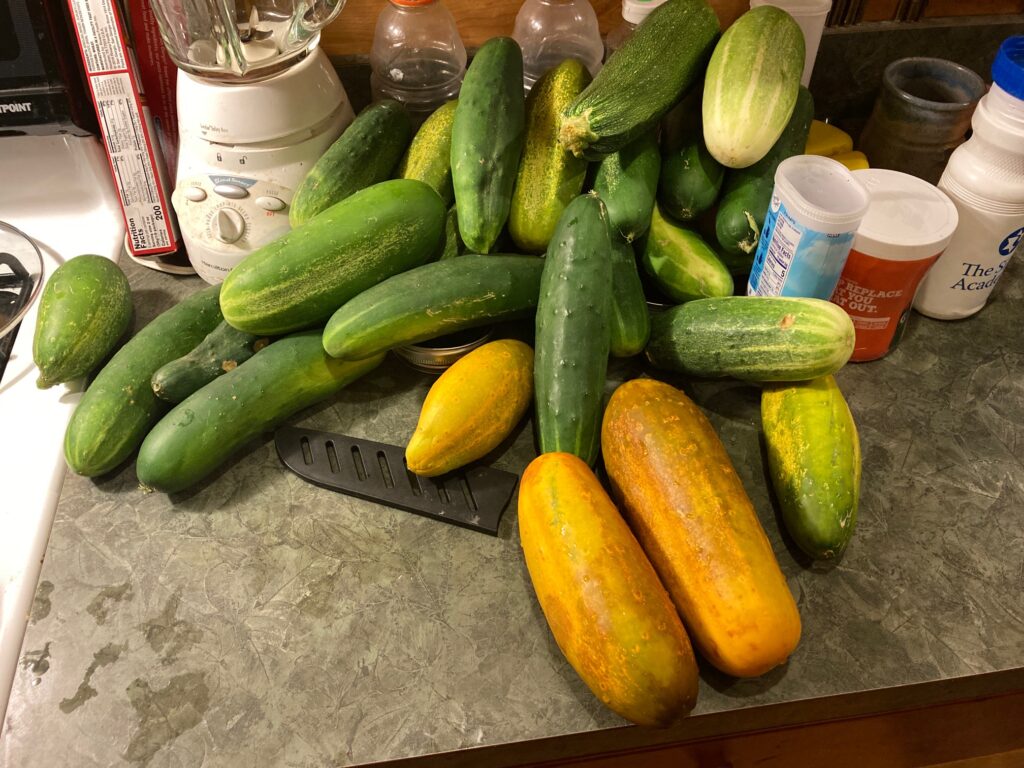
cucumbers from our garden don’t cost a dollar apiece like in the stores, and they are fresher and have no chemicals. Our home made pickles are far tastier than store bought, and have no chemicals. We use the overripe ones to make bread and butter pickles.
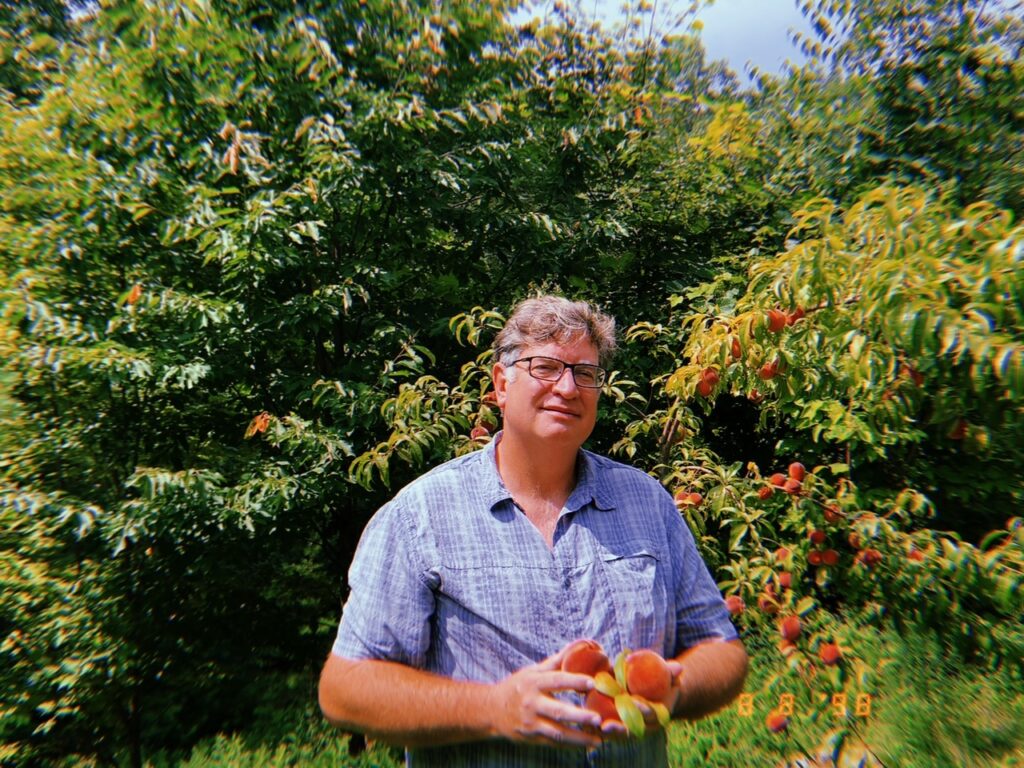
We have a bunch of peach trees. If the bears and the squirrels don’t raid them, we get to enjoy them, and cook with them, all year long
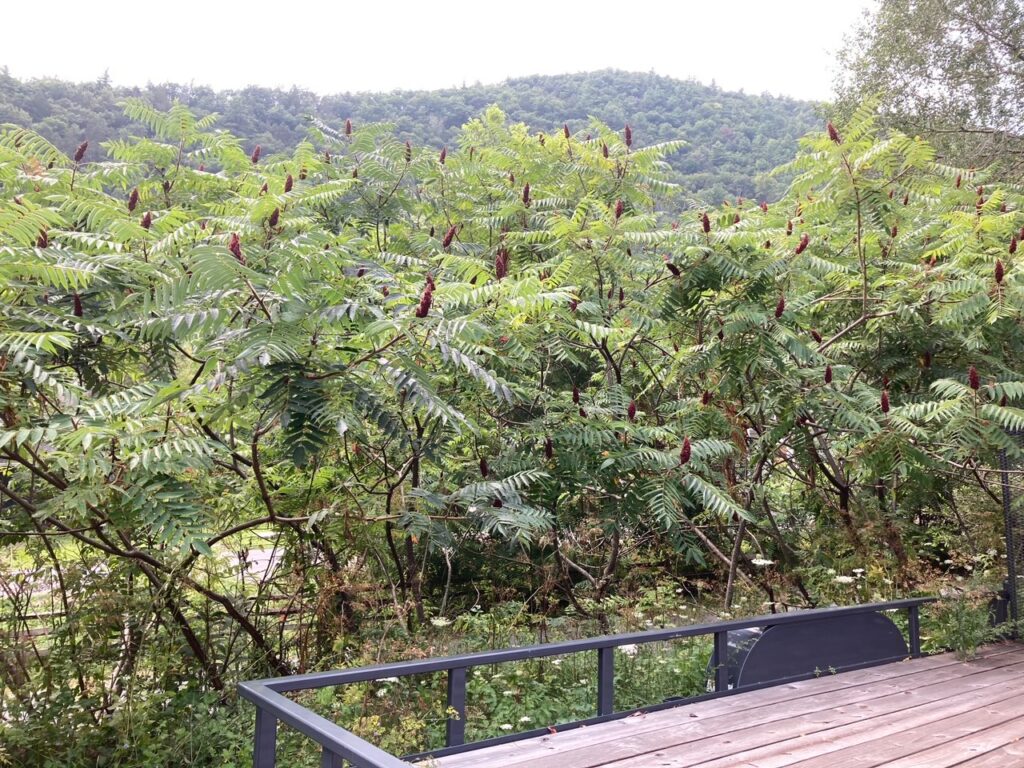
Sumac grows wild everywhere. Steeping a few heads in a bowl of warm water provides the most delicious drink possible. Chill it, serve it with sugar over ice, sumac tea is free, easy to forage, and chemical free
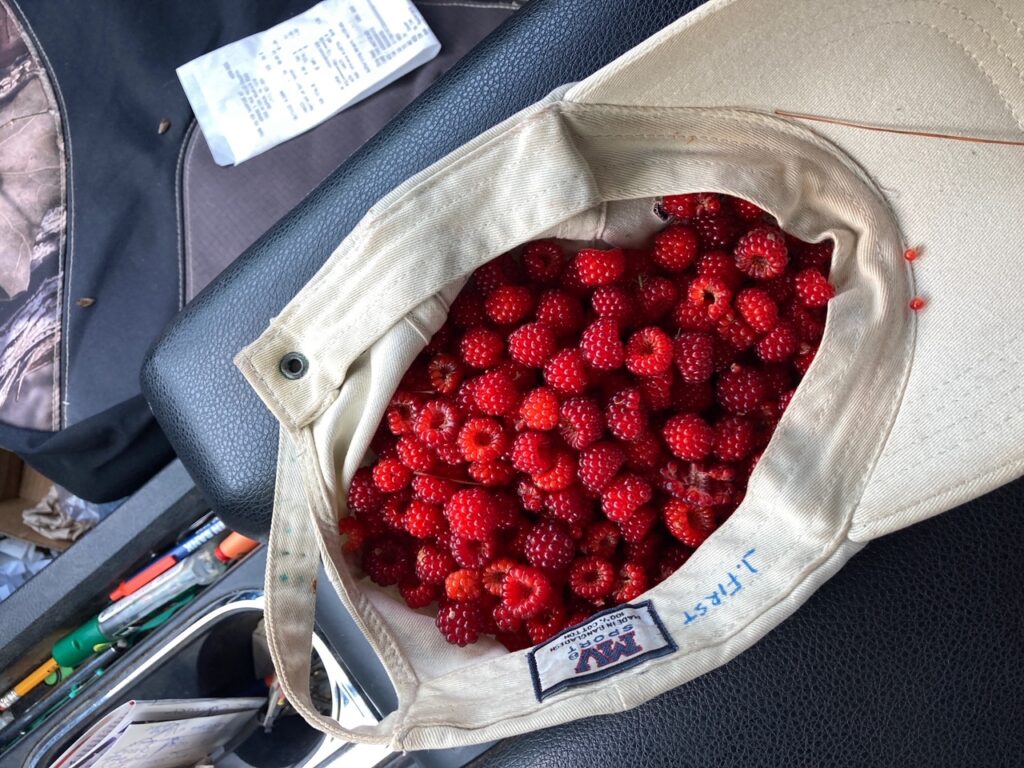
A hatful of red raspberries I foraged in July in the shrubbery of a public parking lot. IN a store you would pay twenty dollars for these wild ones, and they would be half as good. Go forage and pick your own food
Summertime harvests & roadside wisdom with strangers
Presently we are enjoying the height of the summer fruit and vegetable season. Berries wild and cultivated can be picked whenever you have time, often right along the road, and many are for sale at small roadside kiosks and shacks. Same goes for honey, sweet corn, and a host of vegetables. Most of which are organic and have not been sprayed with synthetic chemicals. It is really a wonderful time of year to both eat well, and participate in the natural gathering of food as humans have done since God completed our evolution a hundred thousand years ago.
One of the aspects of summer time food gathering that I enjoy is the natural gathering of people around the sources of these fruits and vegetables. Like roadside stands, selling fruits and vegetables picked that morning by the landowner, standing there wiping their hands on their apron, sweat beading on their forehead, and stuffing cash into their pockets or running off to make change.
The people who shop at roadside stands and kiosks are a pretty interesting group, and most of them are willing to strike up a discussion with the strangers around them with little more incentive than a good joke about the weather or an offering of just-purchased cherries from the stand down the road. At the stand where I bought our annual supply of sweet corn, the discussion centered on whither America given that so many young Americans do not want to work, can’t work, don’t know how to work. Everyone present shared their growing up story about how they learned to work hard, and to enjoy it, and where that strong work ethic took them in their life. This is real rural wisdom that keeps the wheels on America and turning.
As if on cue, a ragged bunch of older teenagers went braying by on Route 147, their dirt bikes drowning out the already damaged hearing of their elders gathered at the sweet corn stand.
“See?” said the proprietress.
“I told the neighbors they can’t ride on our farm without helmets because they are so foolish and are going to get hurt. They still ride through our crops anyhow,” she said with her hands on her hips and a furrowed brow darkening her attractive face.
I see it everywhere I go. Doesn’t matter the skin color: White, black, brown, yellow…today’s young Americans are seemingly all huffing endless free sh*t from their families like a recreational drug, and that lack of responsibility has led to a lack of focus, a lack of real goals, no work ethic, a lack of seriousness about life, etc. And yes, America will undoubtedly fail if these kids don’t grow up, wake up, and get serious about their lives and about their nation. Somewhere I saw headlines about half of the young people think “mis-gendering” someone should be a crime punishable by jail. Obviously these are not serious people, they are are adult-aged children stuck in perpetual childhood and whining about every damned little ridiculous nonsense thing.
It felt nice to have my own observations reinforced by the other elders standing around the corn stand. Anyone like me with a blog and strong opinions is bound to eventually live inside my own head. Getting out into the public and hearing from strangers that I am not alone in my worries about the upcoming generations of Americans is reassuring. No, I am not overly critical and demanding, I am just old fashioned because I believe that a strong work ethic makes you a better person, a more civic minded person, a better citizen, a more productive adult.
Some say that America could not be started over and built again today, with the toxic soup of all of the ridiculous and picayune regulations, rules, ordinances, etc surrounding us. But more than anything the challenge to America seems to be the lack of desire among our young people to want to achieve anything of substance, and their willing subservience to freedom-crushing government bureaucrats.
I wonder if these kids can learn to speak Chinese. At least “Please don’t shoot me” in Chinese ought to be a phrase they are taught, as the willing and easy victims they are building themselves up to be will need some memorable last words before their country is taken by force from them.
Enjoy your summer harvest, friends. I do, and I enjoy the old memories, too. When I was a kid, my mother would send me and a sibling out on hot summer days to pick gallons of blackberries, black raspberries, red raspberries, and blueberries that grew naturally on our property and on adjoining farms. We would return hours later red faced, dirty, scratched up, and with buckets fulled up, and unbeknownst to us, our can-do spirit filled up and stronger, too. We eventually ate what we picked; we earned what we ate. From the fruits of our labors Mom made jams, jellies, pies, and sauces, the Mason jars ever more lining up in the pantry nice and neat for us to eat throughout the coming year.
It is a shame that today’s young Americans are not learning such a simple life lesson.
Where are their parents? Where are the Americans?
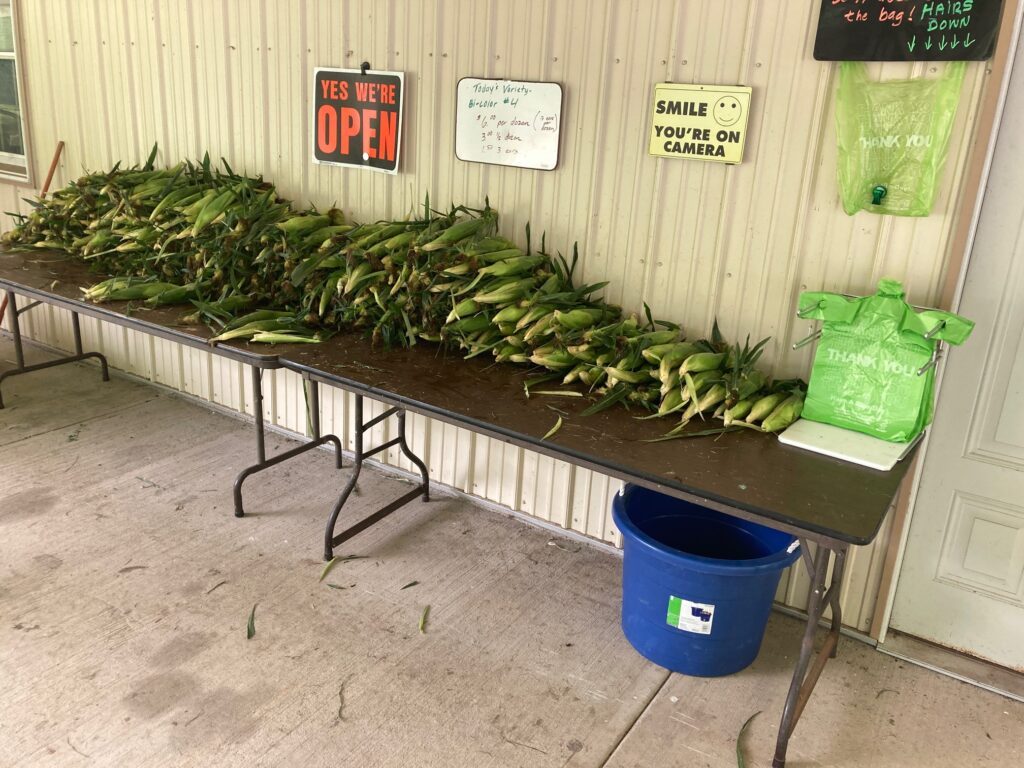
As fast as the corn is brought up from the field it is stuffed by buyers into bags and spirited off to kitchens across the area
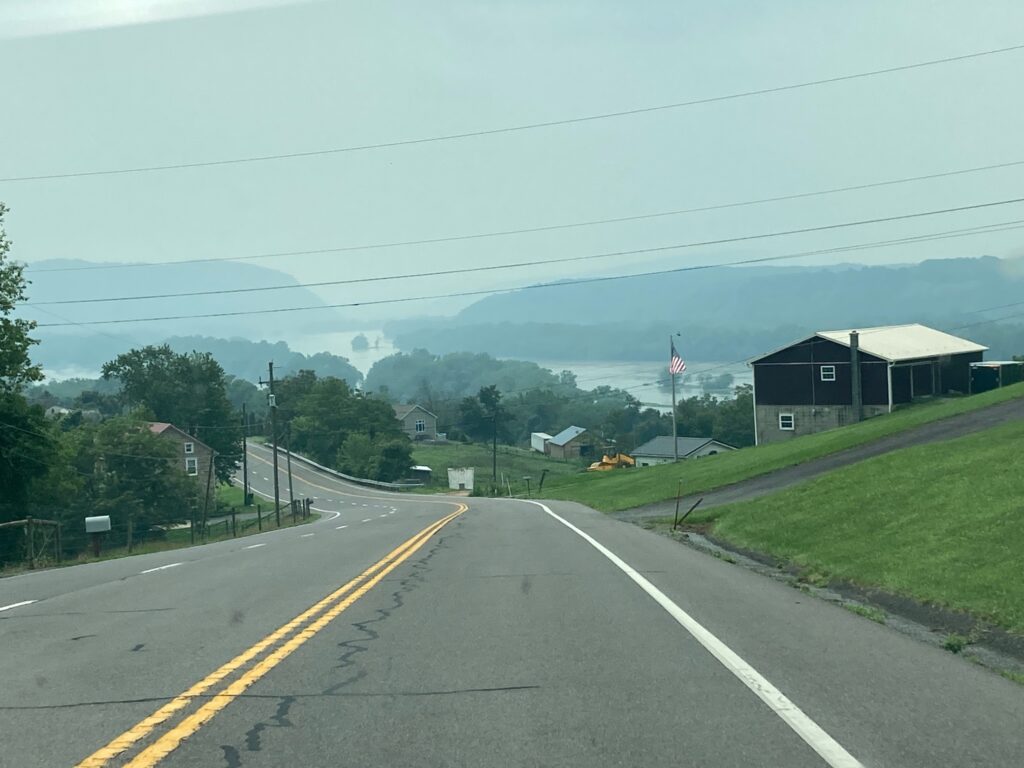
Rural America is full of iconic and inspiring scenic views like this looking at the Susquehanna River water gap

Quaint though they may be, the old-time country mouse values and principles of rural America trump the shallow arrogance of city mice every single time
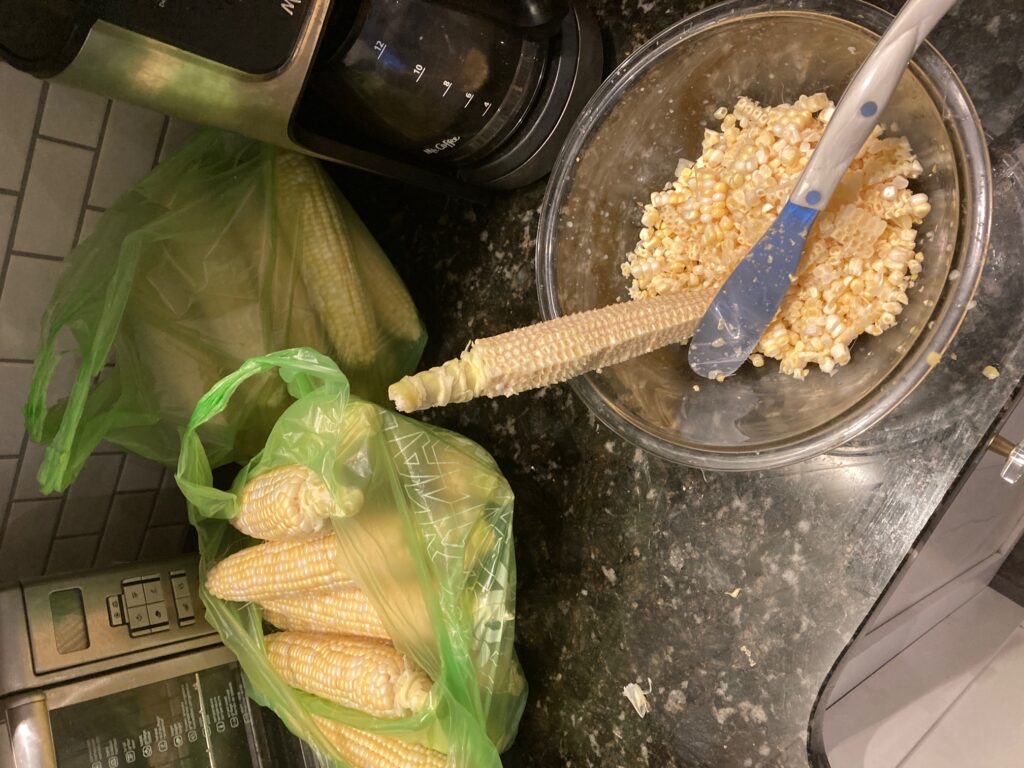
Our fresh sweet corn was eaten a bit with butter and salt, but mostly stripped off the cob and put into ziploc freezer bags for eating throughout the year. Chicken corn chowder is a popular winter soup
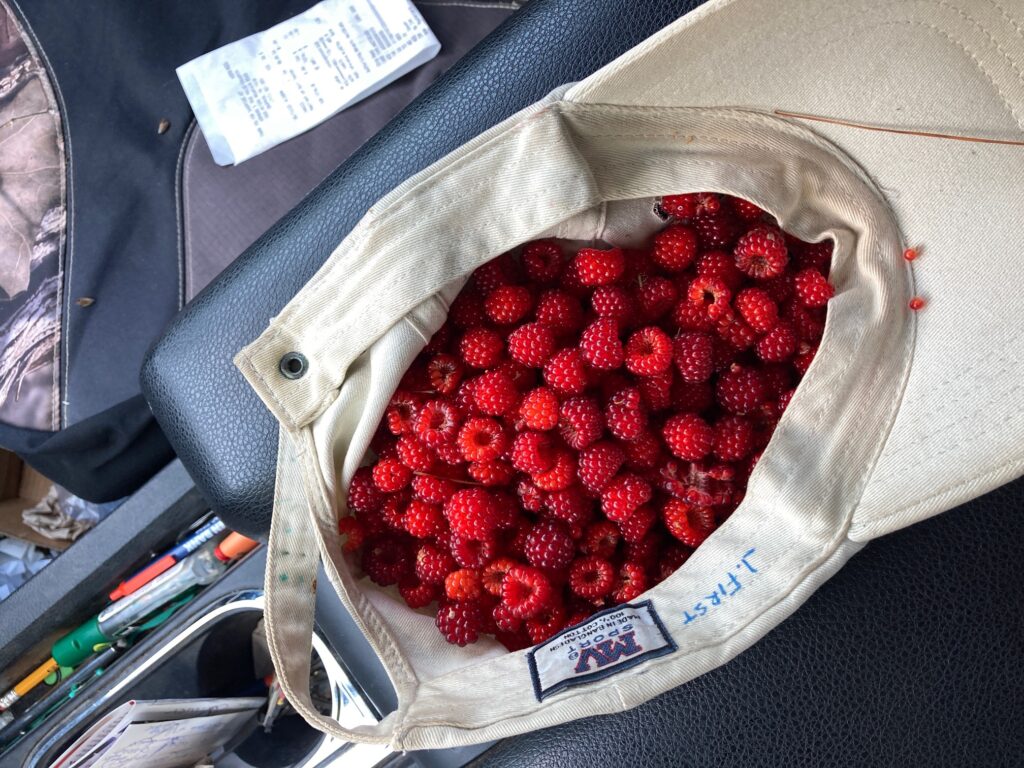
While waiting for my daughter to finish getting her nails done for her wedding, I picked a hatful of red raspberries in the weed patch next to the parking lot. Unbelievably, a woman approached me and asked me for money to buy food. When I offered her my berries she became irate and yelled at me. Our family ate this delicious wild growing roadside fruit over three days.
It’s berry season!
For about 150,000 years we humans have been hunter-gatherers, living a nomadic or semi-nomadic lifestyle that follows the migrating animals and the growth of plants our bodies can eat.
Edible plants were a huge component of hunter-gatherer food, easily dried and carried, many of them lasting well into October and November after plants have gone dormant in most places. Unlike meat, dried edible plants do not easily rot, or attract nibbling animals.
Among edible plants, fruits and wild berries reign supreme.
That is because fruits and berries contain an unusual mix of carbohydrates, sugars, minerals, and vitamins, all of which are necessary for survival. Especially vitamin C, a crucial ingredient in a healthy human body (think scurvy).
The fact that wild berries taste especially sweet and supplement other foods with extra flavor is a big draw.
Sweet-tasting foods rarely occur in Nature.
Blackberries, raspberries, blueberries, huckleberries, wineberries, and many others grow abundantly here in Pennsylvania and across the Eastern US.
Plains Indians like the Lakota, Pawnee, and Comanche made a mix of red meat and berries called pemmican. Ripe berries were turned into a big mush and then worked into meat strips. Usually the mixture was dried on wooden racks in the open air and sunlight, and the dried slabs and sticks were then put under the horse saddle to be worked and broken down into what we would call jerky today.
“Jerky” gets its name from the gentle jerking motion of the horse saddle, as horses step forward. The motion slowly breaks down the meat fibers, making them easily chewed and digested.
So here we are, a bunch of sedentary Americans, mostly eating out of cans and bagged frozen foods.
One antidote to this somewhat unhealthy arrangement is to go outside and do stuff.
Hike, walk, sit and read or sit and chat with someone face to face, fish, canoe, grill out, etc., so many easy outdoor activities.
A really easy outdoor activity is berry picking. Sure there are some thorns, but so what. The benefits are fresh, delicious, healthy berries that are not sprayed with chemicals, or bagged in plastic bags, or frozen. The whole family can do it. Go find a field edge, and bring some hard containers, and start picking.
Humans have been berry picking in that Summertime window of opportunity for a really long time. So long that it can be measured in ice ages come and gone, ice sheets advancing and retreating. That is a lot of years.
If we have been doing that activity for that long, you know it is good and natural. That the whole family can do it, and then make pies together afterwards, makes it all the better.
Just watch out for poison ivy!
